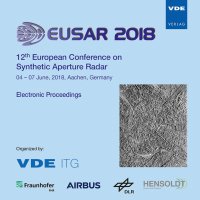Speckle reduction in PolSAR by multi-channel variance stabilization and Gaussian denoising: MuLoG
Conference: EUSAR 2018 - 12th European Conference on Synthetic Aperture Radar
06/04/2018 - 06/07/2018 at Aachen, Germany
Proceedings: EUSAR 2018
Pages: 5Language: englishTyp: PDF
Personal VDE Members are entitled to a 10% discount on this title
Authors:
Deledalle, Charles-Alban (IMB, CNRS, Univ Bordeaux, Bordeaux INP, 33405 Talence, France)
Denis, Loic (Univ Lyon, UJM-Saint-Etienne, CNRS, Institut d Optique Graduate School, Laboratoire Hubert Curien UMR 5516, 42023, Saint-Etienne, France)
Tupin, Florence (LTCI, Telecom ParisTech, Université Paris-Saclay, 75013, Paris, France)
Lobry, Sylvain (Laboratory of Geo-information Science and Remote Sensing, Wageningen University, 6708 PB Wageningen, The Netherlands)
Abstract:
Due to speckle phenomenon, some form of filtering must be applied to SAR data prior to performing any polarimetric analysis. Beyond the simple multilooking operation (i.e., moving average), several methods have been designed specifically for PolSAR filtering. The specifics of speckle noise and the correlations between polarimetric channels make PolSAR filtering more challenging than usual image restoration problems. Despite their striking performance, existing image denoising algorithms, mostly designed for additive white Gaussian noise, cannot be directly applied to PolSAR data. We bridge this gap with MuLoG by providing a general scheme that stabilizes the variance of the polarimetric channels and that can embed almost any Gaussian denoiser. We describe MuLoG approach and illustrate its performance on airborne PolSAR data using a very recent Gaussian denoiser based on a convolutional neural network.


